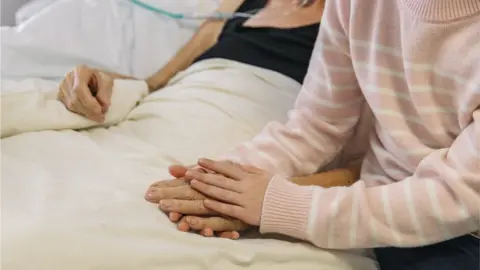Half of stroke patients not getting necessary care, report warns
 Getty Images
Getty ImagesOnly half of Scots who suffered a stroke last year received the necessary care package, new figures show.
Under national targets, 80% of patients should receive a "care bundle" designed to maximise survival and recovery.
However a Public Health Scotland report showed the figure was 50% in 2022 - when the number of reported strokes rose to 11,257, up from 11,055 in 2021.
The government said it was committed to ensuring stroke patients "receive the best possible care".
Chest Heart and Stroke Scotland dubbed the report a "wake-up call" for ministers.
Public Health Scotland (PHS) also said fewer than two thirds of patients were admitted to stroke units within set time limits.
The care bundle includes prompt admission to a stroke unit, brain scanning, screening for swallowing problems and administering of aspirin when appropriate.
Research has shown these treatments are associated with "improved patient outcomes, particularly admission to a stroke unit", the Public Health Scotland (PHS) report said.
PHS said the decline in the number of patients receiving the bundle "will inevitably have led to longer lengths of stay and worse outcomes for those patients affected".
Only NHS Orkney achieved the 80% standard, with every other health board "falling considerable short", the report said.
The percentage of stroke patients admitted to a stroke unit within a day of admission by an NHS board fell from 70% in 2021 to 63% last year - well short of the 90% target.
The rate after four days was 77%, down from 86% in 2021 and short of the 80% target.
Meanwhile the percentage of stroke patients who received a swallow screen within four hours dropped to 68%, down from 73% last year.
The rate for patients receiving brain scans improved slightly, up to 89% from 88% - though it remained below the 90% target.
And the percentage of patients who received aspirin within one day increased to 92% from 91% last year, edging closer to the 95% standard.
'Horrifying and unacceptable'
PHS identified a wide variation in access to specialist stroke care and said post-pandemic pressure had contributed to delays in emergency treatment in some health boards.
Its report found 112 patients received a thrombectomy, which Chest, Heart and Stroke Scotland (CHSS) described as a vital blood clot removal procedure experts suggest could improve the lives of 800 patients a year.
The charity's chief executive Jane-Claire Judson urged the Scottish government to invest more in stroke care
"The 31 people in Scotland who have a reported stroke today will be frightened and their families worried," she said.
"It is horrifying and unacceptable that only half of patients got the full stroke care bundle last year - these are essential measures that greatly improve people's chances of survival and recovery."
Ms Judson added: "Receiving a thrombectomy has a major impact on recovery - something that could mean the difference between a few weeks in hospital or months and months. Yet less than 15% of people who could have benefitted got one last year."
John Watson, associate director for the Stroke Association in Scotland, warned the "extraordinary work" of medical staff was being "undermined" by systematic problems in the health service.
"The alarming figures we see today will continue next year and the year after unless senior management teams inside health boards treat stroke as the priority it needs to be," he said.
"Getting stroke care right means reduced time in hospital, reduced disability amongst patients and lower ongoing social care costs."
The Scottish government said its new Stroke Improvement Plan sets out a strategy for minimising preventable strokes and providing "timely and equitable access" to vital treatments.
"We are focused on ensuring that people who have had a stroke receive the best possible care as quickly as possible to enable them to live longer, healthier and independent lives," a spokesperson said.
"We continue to expect health boards to identify aspects of their stroke services which do not meet the Scottish Standards and to work with their stroke MCNs (managed clinical networks) to improve their standards of care locally."
